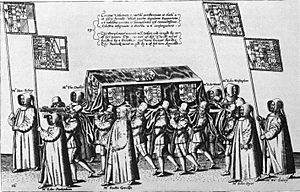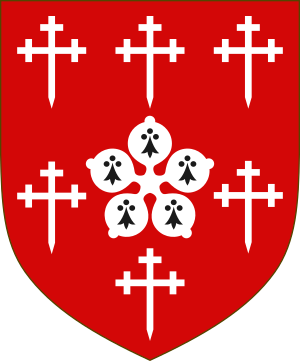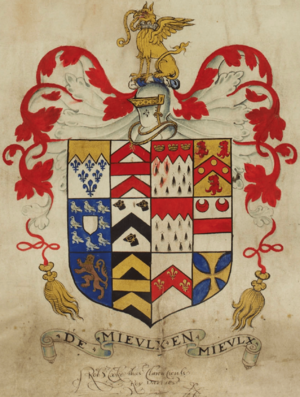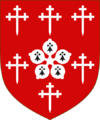Robert Cooke (officer of arms) facts for kids
Robert Cooke (born around 1535, died 1592 or 1593) was an important English official during the time of Queen Elizabeth I. He worked as an Officer of Arms, which meant he was an expert in heraldry (the study of coats of arms and family histories). He quickly moved up in the College of Arms, which is like a special office for these experts. He became the Clarenceux King of Arms in 1567 and held this job until he died.
Cooke helped arrange the large state funeral for Sir Philip Sidney in 1587. However, some other heralds later said that Cooke gave out too many coats of arms to people who didn't really deserve them, just to make money.
Contents
Robert Cooke's Life and Work
Robert Cooke grew up in a family that followed the old Catholic faith, which was not allowed in England at the time. He was raised in the home of Sir Edmund Brudenell, who loved studying family histories. Cooke went to St. John's College, Cambridge, and finished his studies in 1558.
He started his career as a "Rose Blanche Pursuivant Extraordinary" on January 25, 1561. A pursuivant is a junior officer of arms. Just a few days later, he became the Chester Herald of Arms. These events were written down in a diary, which also said that Cooke worked for Lord Robert Dudley, a powerful nobleman.
Cooke was promoted to Clarenceux King of Arms on May 21, 1567. He also temporarily filled in as the Garter King of Arms after Sir Gilbert Dethick died in 1584. As acting Garter, Cooke traveled to France with the Earl of Derby to give the Order of the Garter award to King Henri III in 1584.
Arranging Funerals
As Clarenceux King of Arms, Cooke was in charge of organizing the funerals for all knights living south of the River Trent. One of his most important jobs was overseeing the "magnificent" state funeral of Sir Philip Sidney. Sidney was a famous soldier who died in Flanders in 1586.
The funeral procession took place on February 16, 1587, at St Paul's Cathedral in London. Hundreds of people attended. Detailed drawings of this procession were later published, showing how grand it was.
Cooke had hoped to become the permanent Garter King of Arms, and he had the support of the powerful Earl of Leicester. However, William Dethick, Sir Gilbert's son, got the job instead. Dethick later accused Cooke of trying to take over some of the Garter King of Arms' special duties.
After Cooke died, other heralds also criticized him. In 1595, William Segar, another officer of arms, said Cooke didn't write clearly and gave out many coats of arms to "unworthy persons" just to make money. In 1614, Ralph Brooke, who sometimes worked for Cooke, complained that Cooke had given out more than 500 new coats of arms during his time in office.
Heraldic Visitations
In 1530, King Henry VIII gave instructions for "heraldic visitations." During these visits, the Clarenceux and Norroy Kings of Arms (or their helpers) would travel around their areas. Their job was to record coats of arms and family trees of people who had the right to use them. They also had the power to stop people from using coats of arms they weren't allowed to have.
As a younger herald, Cooke helped with these visitations in several counties, including Worcestershire (1560), Devonshire (1562), Lincolnshire (1562 and 1564), and Leicestershire and Warwickshire (1563).
Once he became Clarenceux, Cooke led many visitations himself. He visited London twice (1568 and 1593), Worcestershire (1569), Herefordshire (1569 and 1584), Shropshire (1569 and 1584), Essex (1570 and 1583), Surrey, Hertfordshire, and Middlesex (1572). He also visited Devonshire (1572), Somerset (1573 and 1591), Cornwall (1573), Kent (1574 and 1589), Dorsetshire (1574), Hampshire and Cambridgeshire (1575), Suffolk (1577), Buckinghamshire (1580), Bedfordshire (1582 and 1586), Gloucester (1583), Berkshire (1584), and Norfolk (1589). Other heralds like Robert Glover, Richard Leigh, and Ralph Brooke helped Cooke with these visits.
Other Writings
Robert Cooke wrote several important books and documents about heraldry and family history. These include An English Baronage, Heraldic Rudiments, An Ordinary of Arms, and A Treatise on the Granting of Arms. One historian, Sir Simonds d'Ewes, wrote on a copy of An English Baronage that it had "a world of errors," meaning readers should be careful.
See also
Images for kids
 | Tommie Smith |
 | Simone Manuel |
 | Shani Davis |
 | Simone Biles |
 | Alice Coachman |







